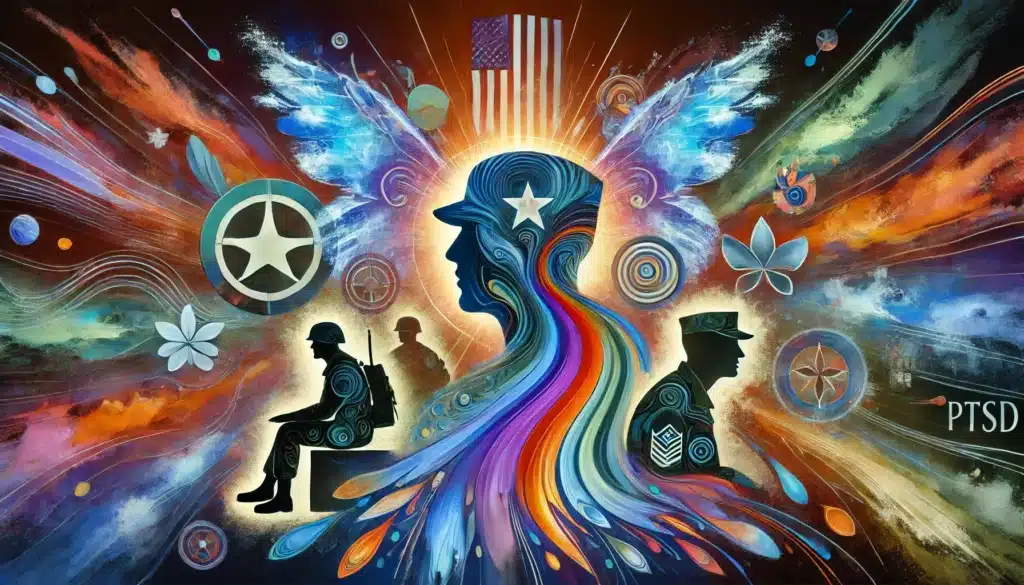
[ad_1]
Post-Traumatic Stress Disorder (PTSD) is a severe mental health condition affecting millions worldwide, particularly those who have experienced the trauma of war. Veterans returning from combat often struggle with flashbacks, anxiety, depression, and emotional detachment, making it difficult to reintegrate into everyday life. Traditional treatments, such as talk therapy and antidepressants, often fall short for many sufferers. However, recent research into MDMA-assisted therapy is providing new hope for veterans with PTSD, suggesting that this once-stigmatized drug could play a revolutionary role in treating trauma.
MDMA for PTSD: A New Hope for Combat Veterans Seeking Healing
Understanding PTSD and Its Impact on War Veterans
PTSD occurs when an individual is exposed to extreme traumatic events, such as combat, leading to long-term psychological distress. Symptoms include intrusive memories, nightmares, emotional numbness, and hypervigilance. For veterans, these symptoms are often exacerbated by the violent and life-threatening experiences of war.
Studies estimate that 11-20% of veterans who served in operations Iraqi Freedom and Enduring Freedom are diagnosed with PTSD, and this number may be underreported due to stigma around mental health in military culture. Veterans with PTSD are at higher risk of substance abuse, depression, and suicide. In fact, the Department of Veterans Affairs reports that about 17 veterans die by suicide each day in the U.S., a statistic directly tied to untreated or poorly managed PTSD.
Traditional therapies, such as Cognitive Behavioral Therapy (CBT) and Exposure Therapy, aim to help veterans process trauma by revisiting painful memories in a controlled environment. However, these treatments often involve revisiting traumatic experiences, which can retraumatize individuals or lead them to disengage from treatment.
MDMA: From Party Drug to Therapeutic Tool
MDMA, commonly known as ecstasy or molly, is a synthetic drug known for its empathogenic effects, enhancing feelings of connection and emotional openness. Historically classified as a Schedule I drug in the U.S. (meaning it was considered to have no medical use and a high potential for abuse), MDMA was largely associated with recreational use. However, in the 1980s, researchers began exploring its therapeutic potential before it was outlawed in 1985.
MDMA works by releasing large amounts of serotonin, dopamine, and oxytocin in the brain, fostering empathy and reducing fear responses, qualities that are essential when revisiting traumatic memories. Over the last two decades, organizations like the Multidisciplinary Association for Psychedelic Studies (MAPS) have pushed for research into MDMA as an adjunct to psychotherapy, particularly for those with treatment-resistant PTSD.
MDMA-Assisted Therapy: The Clinical Breakthrough
In MDMA-assisted therapy, patients undergo a series of guided psychotherapy sessions where they are given controlled doses of MDMA in a clinical setting. The therapy is structured to allow individuals to confront their trauma without the overwhelming fear and emotional distress that typically accompany such recollections.
Studies have shown groundbreaking results. In the largest Phase 3 clinical trial, published in Nature Medicine in 2021, 67% of participants who received MDMA-assisted therapy no longer met the diagnostic criteria for PTSD after just three sessions. This is compared to only 32% of those who received traditional therapy without MDMA. These findings are especially significant for veterans, many of whom have found traditional treatments ineffectives for PTSD**
MDMA-assisted therapy differs from other treatments in that it creates an emotional state where patients feel safe, supported, and connected to their therapist. This state enables them to confront painful memories with reduced fear and anxiety. MDMA also promotes neuroplasticity, allowing the brain to form new, healthier associations with traumatic memories.
During therapy, veterans often describe feeling more compassionate toward themselves, which is crucial for processing guilt, shame, and grief related to their experiences. The supportive environment, combined with the euphoric and empathogenic effects of MDMA, facilitates the deep emotional processing needed to heal from trauma.
The FDA’s Response and Path to Approval
MDMA is on the verge of becoming a legal treatment for PTSD. In 2017, the U.S. Food and Drug Administration (FDA) granted MDMA Breakthrough Therapy designation, fast-tracking its development for PTSD treatment. This designation highlights the therapy’s potential to provide significant improvement over existing treatments.
The Phase 3 clinical trials—the final step before potential FDA approval, have shown such promising results that experts believe MDMA-assisted therapy could become legally available by 2024. This would mark a historic moment for both mental health treatment and the psychedelic research field.

The VeteranTransformation
For many veterans, MDMA-assisted therapy has been life-changing. One such veteran, Jonathan Lubecky, who served in Iraq, participated in a MAPS study after struggling with severe PTSD for years. Lubecky credits MDMA-assisted therapy with saving his life, stating that it allowed him to process his trauma in a way that traditional therapy never could. After the sessions, Lubecky was able to regain control over his life, form healthy relationships, and return to a fulfilling career.
Stories like Lubecky’s are not uncommon, with many veterans advocating for the legalization of MDMA as a therapy for PTSD. These personal accounts highlight the urgent need for innovative treatments, especially for individuals who have not responded to conventional methods .
Challenges and Considerations
Wsisted therapy offers promising results, it is not without challenges. Concerns about potential abuse, the need for trained therapists, and the high cost of treatment may limit accessibility in the short term. Additionally, MDMA is still classified as a Schedule I drug in many countries, including the U.S., meaning it is illegal outside of controlled research settings.
Moreover, while many patients experience profound healing, the therapy is not a cure-all. Experts stress that MDMA-assisted therapy should be viewed as part of a comprehensive treatment plan, which may include ongoing therapy and support networks to ensure long-term recovery.
The Future of MDMA for PTSD
As research continues and the regulatory landscape evolves, MDMA-assisted therapy may soon become a mainstream treatment for PTSD, offering new hope for veterans and others struggling with trauma. The combination of psychotherapy and MDMA represents a paradigm shift in mental health treatment, moving beyond symptom management to address the root causes of trauma.
For veterans and survivors of war, MDMA-assisted therapy could provide a much-needed path to healing, offering relief from years of suffering and improving overall quality of life.
Related
[ad_2]
Source link